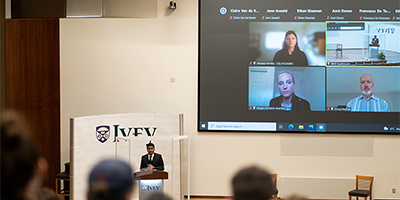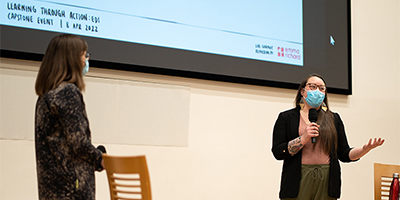Understanding of Indigenous issues, knowledge, and culture won’t happen overnight, but acknowledging what you don’t know and committing to learn more is the first step.
That was the message to HBA1 students from local Indigenous community members and experts in First Nation's affairs at the Learning Through Action Capstone: Learning Through Local Communities event to mark the end of the program.
The goal of the two-day event was to encourage spiritual growth and prepare the students to engage in inclusive community planning. Activities included workshops on inclusive planning and visualization, a panel discussion with the organizers of an intentional Indigenous learning program, and a presentation from a representative from Western University’s Office of Indigenous Initiatives (OII).
Giving back to the local community
 The students also tackled two case challenges related to the City of London’s civic engagement and mobility planning.
The students also tackled two case challenges related to the City of London’s civic engagement and mobility planning.
One had them craft an inclusive approach to engagement with community members, particularly those from Indigenous and minority groups. The other had them consider ways to offer accessible mobility with equity and environmental safety in mind. Both cases were written by HBA2 student Jash Kalyani, in consultation with City of London staff partners.
Related to this story
Another important part of the event was reflection on the students’ learnings from taking the online educational program, The Path: Your Journey Through Indigenous Canada™, throughout the year.
The idea for the EDI focus came from Kalyani, who moderated the main events. Kalyani said his goal was to work with the School to create an event that recognized the relationship between global and local and encouraged students to give back to the community and challenge existing practices.
“I was excited for you all to do the unconventional, to really take on a challenge and ask the difficult questions. To understand identity, its complexity, and the dynamic ways in which it has influenced decision-making in local communities,” Kalyani told the students. "Embrace those conflicts. A strong learning community is based on conflicts and clashes. If everything is perfect and no one is talking, perhaps no learning is happening.”
Advice for Indigenous learning
The students learned that embracing discomfort is key for understanding Indigenous cultures, knowledges, and the legacies of settler colonialism in Canada. During the panel session, the three leaders behind Pillar Nonprofit Network’s Local Indigenous Learning Series gave advice for dealing with discomfort and attempting Indigenous learning programs in the workplace or elsewhere. Speakers included Dharshi Lacey, Director, Equity, Inclusion & Governance at Pillar Nonprofit Network; Joe Antone, Clinical Lead/Social Worker with Atlohsa Family Healing Services; and Frances Moore, Family Centre Manager at Nshwaasnangong Child Care and Family Centre.
Moore, who is an Anishinaabe Kwe from Timiskaming First Nations, said she got involved in Indigenous learning initiatives to help others gain knowledge and to address anti-Indigenous racism. Through such experiences, Moore said she has learned to be patient, recognizing that many non-Indigenous people haven’t had access to Indigenous knowledge and culture.
“Learning, unlearning, and relearning is not something that you are going to do overnight. It is a continuous process. It takes a lot of strength and courage,” she said. “It's certainly a lot harder to do … than to hold on to false and outdated, or wrong information."
[Indigenous learning] is uncomfortable because you have to reflect on your own self and look at your biases and how you may have behaved in the past.”
– Frances Moore
Commit to active learning
Antone also stressed the importance of recognizing the learning process can arouse tension and conflict.
“The Joe that came out of school 10 years ago had a much more radical, angry approach to these issues. I quickly learned that when people made themselves vulnerable by saying, ‘I don't know, or help me understand,’ that was really an intimate moment. It was an expression of trust to me,” he said. “[Indigenous learning] requires trust, kindness, vulnerability, and supporting a person to move through these things.”
Sharing how she has had to unlearn false narratives, Lacey said people have to commit to being active learners of Indigenous knowledge.
Mistakes will be made and you have to learn from them. I’ve found the reason why this work does not progress is people say, ‘It's too hard,’ and they stop," she said. "So It's really about looking at this as a journey as leaders.”
Lessons from the students’ journey
The theme of continuous learning carried through when discussing student takeaways from The Path™.
Nadine de Gannes, HBA ’09, Associate Faculty Director of the HBA program, said the most rewarding insight from the students’ reflection essays on The Path™, was their sense of responsibility to learn more.
“One of the learnings I took from some of your essays was where you situated responsibility … I loved when I saw the words on the page, ‘I am responsible here because I didn’t know,” she said.
Sara Mai Chitty, Curriculum & Pedagogy Advisor, with Western’s OII, said the students’ reflections will help to inform future university programs and/or resources on local Indigenous histories and knowledges.
What’s at stake is responsibility today and tomorrow … I benefitted from your journeys of reflection.”
– Nadine de Gannes
The six Rs of Indigenous education

Chitty and Erin Huner, Director, Culture and Inclusion at Ivey, reminded the students of six important words that guide Indigenous-centred approaches to collaboration and partnership, while local illustrator Emma Richard visualized the messages through an artful infographic.
The six words included:
- Reciprocity – Living with one another and the land and considering future generations;
- Relationality – Considering what we can do for each other with the resources at hand and how to measure learning and unlearning;
- Responsibility – Reflecting on what you’ve learned, what it means, and what to do;
- Refusal – Sometimes no is the answer. Consider who is missing, and be an ally;
- Respect – See the humanity; and,
- Relevance – Consider the impact of history on power dynamics and strive to co-define content and outcomes.



